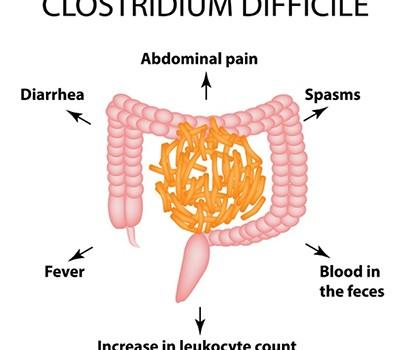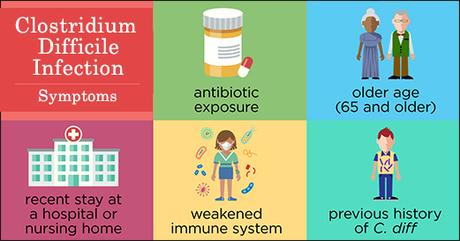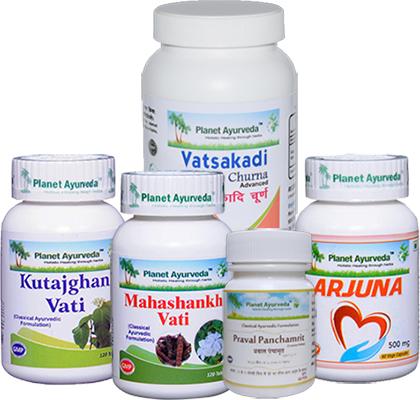
Abstract
The clostridium difficile is the major cause of antibiotic associated colitis and pseudomembranous colitis. The organism produces at least two endotoxins A and B which are responsible for intestinal damage. The infection happens most often in the hospitals where the organisms reside in rooms or in toilets and is transmitted by hands to the internal environment of humans. Then it proliferates in the colon when the intestinal flora is disturbed by administration of antibiotics, generally the broad spectrum antibiotics such as Clindamycin. In this article our main focus will be on the discussion of this bacterial species and what symptoms it produces when it gets in contact with the human body along with some herbal formulations that can be used in this condition successfully.

Introduction
Diarrhoea is quite common in patients receiving antibiotics and it usually stops when the antibiotics cease. In about 40% of patients with diarrhoea Clostridium difficile can be cultured from stool and it is assumed that the condition is caused by a disturbance of the intestinal flora. In a small proportion of patients, the condition progresses to antibiotic-associated colitis. In some of the latter patients, the inflammation of the colon is so severe that a pseudomembrane forms over the mucosa hence the name is given pseudomembranous colitis. The condition is well discussed along with the pathology, clinical features, investigation and management.
But moving on to the condition caused by Clostridium difficile infection. Let's discuss about Clostridium difficile.
Facts about Clostridium Difficile
- Clostridium difficile is a gram negative bacteria that causes severe diarrhoea and colitis which is an inflammation of the colon.
- The bacteria is mostly affecting those people who are on antibiotics.
- The person who has this infection, will get it again in the subsequent 2-8 weeks.
- The risk of developing this infection increases after being 65 or older, if you're staying at a hospital or nursing home, due to a weak immune system like in HIV or AIDS, cancer or patients on immunosuppressant drugs.
Pathology of Clostridium Difficile Infection
Antibiotic associated colitis and pseudomembranous colitis can be regarded as a continuum. Initially the mucosa shows focal areas of inflammation and ulceration. The ulcers become covered by a membrane of fibrin, debris and polymorphs, which may spread to cover the entire mucosa.
Clinical Features
The clinical features or symptoms begin during the first week of antibiotic therapy but in some cases the symptoms may arise when the antibiotic treatment is finished. The onset of symptoms can be insidious along with lower abdominal pain. With these symptoms the motion frequency also increases. The diarrhoea may become watery and profuse. Due to the presence of symptoms the patient's condition may resemble acute ulcerative colitis. Indeed, the condition may progress to toxic dilatation.
Investigation
The diagnosis is made on the rectal appearance at sigmoidoscopy with erythema, white plaques or a confluent pseudomembrane. Biopsy may confirm the diagnosis if the focal inflammation and membrane is seen but in some cases it is indistinguishable from ulcerative colitis. However, a normal rectal mucosa does not exclude the disorder. For some patients the condition is limited to the right colon. The confirmation is done by cytotoxicity assay for toxin A and B performed on a filtrate from the stool.
Management of clostridium difficile infection
The offending antibiotic is to be stopped. The patient must be isolated and supportive therapy is given in modern science like in ulcerative colitis. The treatment of choice for mild to moderate disease is Antifungal, Antibacterial and various others.
Ayurvedic view point for Clostridium difficile infection
The Ayurvedic viewpoint of Clostridium difficile infection suggests that due to intake of antibiotics which is considered as the nidaan or etiological factor, aggravation of pitta in the pakvashaya that is intestines happens which results in the creating non suitable environment for intestinal flora hence diminished healthy intestinal flora. This also results in low immunity of heena vayadhishamatva thus the agantuj karan or external organisms are having a chance to infect the human body, which is what exactly happens in the clostridium difficile infection.
Thus the treatment includes things which can pacify this aggravated pitta dosha. The herbs like kutaj ( Holarrhena antidysenterica), bael ( Aegle marmelos) have fantastic results in controlling the symptoms and on the other hand some herbo mineral formulations like shankh bhasma, kamdudha ras etc. has fantastic results in pacification of pitta dosha.
Herbal formulations by Planet Ayurveda
Planet Ayurveda is a leading Ayurvedic firm which deals with the manufacturing of herbal formulations. These formulations are prepared using potent herbs which are really effective in managing many conditions related to the intestines. The formulations prepared by Planet Ayurveda do not contain any kind of adulterants, dyes, additives, fillers etc. These medications are really potent in supporting the reestablishment of intestinal flora and thus getting rid of infection and are very fruitful hence giving positive noticeable results. The medication or formulations offered by Planet Ayurveda for the management of clostridium difficile are as follows.
- Kutajghan Vati
- Vatsakadi Churna
- Mahashankh Vati
- Arjuna Capsule
- Praval Panchamrit


Product Description
1. Kutajghan Vati
Kutaj (Holarrhena antidysenterica) belongs to Kutaja kula and Apocynaceae family. In Ayurveda texts it is mentioned that kutaja is having healing properties and is very well potential in pacifying pitta (whose imbalance is the reason for this condition). It has ruksha guna (Drying property), tikta and kashaya rasa (bitter and astringent taste) along with katu (pungent) vipaka. Kutaja acts as a deepana herb which means it increases the diminished digestive fire and hence the mala (stool) comes in binded form rather than in loose form as this property makes this herb to behave as an antimotility drug. Thus reducing the frequency to pass motion in the infection of clostridium difficile.
Dosage: Two tablets twice daily after meals with lukewarm water.
2. Vatsakadi Churna
Vatsakadi Churna is an effective combination of 50% kutaja ( Holarrhena antidyssentrica) and 50% bilva ( Aegle marmelos). Kutja helps in reducing the motion frequency and on the other hand bilva is very effective in reducing the passage of mucus along with stool and also decreases the amount of bleeding with passage of stool. The formulation also reduces the bloating, intestinal irritation and pain. Bilva has properties like anti microbial, anti bacterial and thus helps in establishing natural flora of intestine. This herbal formulation also shows preventing effects and thus protects the tissues from damage due to inflammation.
Dosage: Half tsp twice daily after meals with lukewarm water.
3. Mahashankh Vati
Mahashankh vati is the best classical formula which helps in the improvement of digestion and also effectively relieves symptoms like bloating and indigestion. This formulation is also mentioned in classics and contains pippali ( piper longum), chitrak ( Plumbago zeylanica), danti ( Baliospermum montanum) and many more. The formulation helps in naturally dealing with indigestion, loss of appetite, hyper acidity along with gas and other digestion related problems. In clostridium difficile infection mahashankh vati helps relieve the sharp spasm usually felt or observed by the patient.
Dosage: One tablet thrice a day 10 minutes before meals with lukewarm water.
4. Arjuna Capsules
Arjuna ( Terminalia arjuna) is very well known from ages to support and regulate normal functioning of the body especially the circulatory system. But here it helps in reducing excessive bleeding and works best as a coagulant. Arjuna is also a very great herb for balancing pitta dosha and kapha dosha. Due to excess intake of antibiotics the pitta in the body aggravated which thus removes the natural flora of the intestines and giving room for clostridium difficile infection but Arjun helps in pacifying the pitta thus maintaining the natural flora of the intestine.
Dosage: One capsule twice a day after meals with lukewarm water.
5. Praval Panchamrit
The Praval Panchamrit is prepared using many herbo minerals components like pearl bhasma ( mukta bhasma), conch shell bhasma ( shankha bhasma), pearl oyster bhasma ( shukti bhasma) and many more. These all herbs are a very good combination for relieving the symptoms present in this condition especially the reestablishment of intestinal flora. It relieves pitta dosha as well as a feeling of burning in the digestive tract too. The formulation is also very beneficial in hyperacidity, anorexia, and excessive diarrhoea as it has an antispasmodic effect too. Praval panchamrit also relieves bloating.
Dosage: Two tablets twice a day after meals with lukewarm water.
Conclusion
We understand the importance of antibiotics but when a patient is over exposed to the antibiotics at that time there are maximum chances to catch this kind of infection and thus making the condition worse. The ayurvedic formulations explained above are really helpful in this condition and are 100% herbal. There is no addition of preservatives, dyes, adulterants etc. With Ayurvedic medication a person has to be very patient as the process of its working is slow but quite effective. The Ayurvedic supplements are prepared after testing the ingredients and every batch as consistency of quality matters. In case of any query kindly visit www.planetayurveda.com

